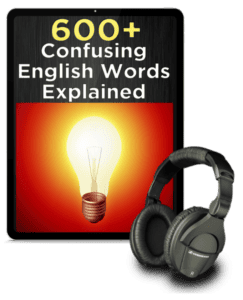
Download 30 Ask the Teacher lessons
When do we use whose vs. who’s in English?
These are pronounced exactly the same, but they have different meanings.
Whose: Possessive pronoun
Whose is a possessive pronoun (like my, your, his, Sarah’s, etc.)
We use it when we don’t know the owner of something. For example:
- Whose jacket is this?
- I’m not sure whose car is parked in front of our driveway.
- The police are trying to discover whose fingerprints are on the gun.
Who’s: Short form of “who is” or “who has”
Who’s is a contraction, a short form, of the words “who is”(more common) or “who has.” For example:
- Who’s coming to the party?
(who is coming) - I don’t know who’s responsible for the delay.
(who is responsible) - We have a friend who’s been learning English for many years.
(who has been learning)
Now you know when to use whose vs. who’s! Can you make your own example sentences? Give it a try to see if you can do it correctly.
And make sure to download all our past “ask the teacher” lessons to learn lots more.










